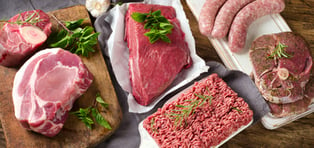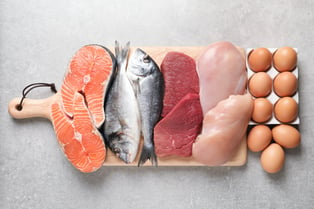Yes! A big contribution to colorectal cancer risk includes lifestyle habits like smoking, alcohol consumption, and diet! Data suggests that change in food habits could reduce up to 70% of colorectal cancer incidence.1 Even though the International Agency for Research on Cancer declared that processed meat was carcinogenic and that red meat was probably carcinogenic to humans in 2015, scientists are still trying to understand how and why.
carcinogenic and that red meat was probably carcinogenic to humans in 2015, scientists are still trying to understand how and why.
Recently, a study2 identified a mechanistic link between red meat consumption and the development of colorectal cancer. We have known for many years that diets high in fat and processed/red meats can increase risk of colorectal cancer, but we are starting to learn “how.”%20can%20change%2c%20or%20damage%2c%20the%20cells%20in%20your%20colon.%20This%20change%20ultimately%20makes%20them%20more%20prone%20t.png?width=314&name=Definitions%20Mechanistic%20link%20a%20term%20used%20to%20describe%20the%20small%20biological%20details%20of%20how%20one%20thing%20(like%20eating%20red%20meat)%20can%20change%2c%20or%20damage%2c%20the%20cells%20in%20your%20colon.%20This%20change%20ultimately%20makes%20them%20more%20prone%20t.png)
In this study, scientists looked at 900 adults with colorectal cancer and were able to sequence the DNA of the person and their tumor. Because these 900 adults were participants in prospective cohorts that followed adults over the past 30+ years, there is a lot of basic data about their lifestyle habits.
Tumor DNA from adults that ate more red meat looked different from Tumor DNA from adults that ate more fish/poultry. And more importantly, the normal colon cell DNA from adults that ate more red meat showed a pattern of DNA damage, or a pre-cancer stage, that was different from normal colon cell DNA changes in adults that ate poultry/fish.
 These differences were also more evident on the left side of the colon. This means that precancerous or cancerous changes in the colon due in part to red meat consumption can be spotted by colonoscopy or by sigmoidoscopy—so remember to get screened!
These differences were also more evident on the left side of the colon. This means that precancerous or cancerous changes in the colon due in part to red meat consumption can be spotted by colonoscopy or by sigmoidoscopy—so remember to get screened!
Remember, there isn’t one risk factor that can predispose you to developing colorectal cancer. But there are a lot of risk factors that can add up over time. Take a look at your risk factors. If you have several risk factors stacked against you, it may be worth cutting back on some of the red/processed meats in your diet.
1Willett WC. Diet and cancer: an evolving picture. JAMA. 2005 Jan 12;293(2):233-4. doi: 10.1001/jama.293.2.233. PMID: 15644551.
2Discovery and features of an alkylating signature in colorectal cancer. Carino Gurjao, et al. Cancer Discov June 17 2021
DOI: 10.1158/2159-8290.CD-20-1656


